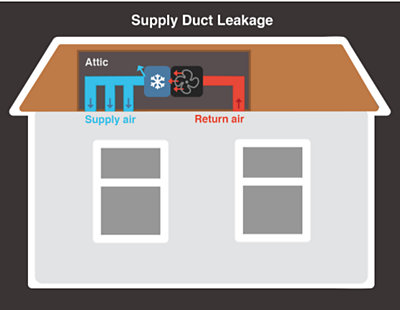Should My AC Vent Be Open or Closed?
The answer? Your AC vents should always be open.
Why? Because of closing AC vents:
- Increases energy bills
- Makes you uncomfortable
- Damages to your AC system
While closing vents in your home may seem like it makes sense, particularly in rooms you don't use during those Colorado summers, you'll find over time that you're causing more harm than good. Let’s take a closer look at all of those problems.
Closing AC vents increases energy bills
If you close your AC vents, you actually increase the amount of conditioned air that gets wasted via duct leaks.
You see, your AC pushes out cool, conditioned air through your ductwork and into your home. But when you close a vent (yes, even just a few), it increases the pressure inside the ducts. And the more pressure inside the ducts, the more air gets pushed out of tiny leaks in your ductwork.
Don’t think your home’s ductwork has holes or cracks for air to leak out of? Think again. According to Energy Star, the typical home already loses anywhere from 20 to 30% of conditioned air to duct leaks. So, if you’re keeping AC vents closed, just expect that number to increase even more (along with your energy bills).

An example of how conditioned air in a typical home gets wasted due to duct leaks.
Closing AC vents makes you less comfortable
So, we already know that closing AC vents increases pressure inside your ductwork. But that added pressure also causes your AC’s blower motor to work slower and push out less cool air, leaving you less comfortable.
Now, to be fair, you’ll only have this problem if you have a “PSC” blower motor. Otherwise, you’ll just see an even higher energy bill.
The two types of blower motors you could have include:
- “PSC” blower motor- These blower motors only blow at a fixed speed and can’t ramp up to overcome extra pressure from closed vents. Instead, they just slow down and blow less air. So, if you have a PSC blower motor, you’ll get less cool air from open air vents if you close AC vents.
- “ECM” blower motor- These blowers can adjust its speed according to the level of work needed. So, no, closing vents when you have an ECM blower motor won’t make you less comfortable, but it will increase your energy costs because your blower motor will be working harder and using more energy to overcome the added pressure inside your ductwork.
Closing AC vents damages your AC system
Remember how a PSC blower produces less cool air when an air vent is closed? Well, less airflow in your AC system can cause your evaporator coils to freeze over and eventually destroy your compressor (P.S. a compressor can cost up to $3,500 to replace).
You see, your AC’s evaporator coils are filled with cold, cold refrigerant that absorbs heat and moisture from the air inside your home. But when less warm air is blown over the cold coils, the coils’ temperature quickly drops and freezes over as moisture from the air hits them. And eventually cold refrigerant can flow back to the outdoor unit, destroying the compressor. (This issue is called “slugging.”)
Bottom line: Leave your AC vents open!
If you want a healthy AC, a comfortable home and reasonable energy bills, you should always leave your AC vents open (even in unused rooms).
Need AC Repair in Denver?
Have questions about leaving your AC vents open? Just contact us. We’re happy to help. We provide expert air conditioning repair, maintenance and installation to the Denver Metro area, including Aurora, Arvada, Boulder, Castle Rock, Highlands Ranch, Lakewood, Longmont, Westminster, and more.
Related articles:
Need help from a Colorado Plumbing, Heating, Cooling, or Electrical Specialist?
For your convenience, you can request an appointment in one of two ways:
- Call us at (303) 436-2525 for immediate assistance.
- Click on the button below to schedule your appointment online.
Related Reading
Join Our Email Newsletter
Receive updates, current news, promotions, and industry tips.
